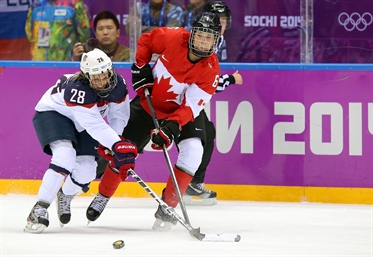Building on Olympic momentum
Building on Olympic momentum
Only female pro league seeks spotlight

 Canadian forward Rebecca Johnston (right, against Team USA’s Amanda Kessel) of the Calgary Inferno is the first scoring leader of the Canadian Women’s Hockey League with three goals in two games. Photo: Andre Ringuette / HHOF-IIHF Images
Canadian forward Rebecca Johnston (right, against Team USA’s Amanda Kessel) of the Calgary Inferno is the first scoring leader of the Canadian Women’s Hockey League with three goals in two games. Photo: Andre Ringuette / HHOF-IIHF Images
The anger wasn’t directed at Andress, though. The commissioner of the Canadian Women’s Hockey League, which started the season with three games last weekend, says many people called or e-mailed her after the Games wondering why women’s hockey players don’t get paid. Every four years, the world takes note of women’s hockey – just look at the great media attention and massive TV numbers – and the same question is asked.
Why don’t women get paid to play?
For Andress, the solution is simple.
“We need the fans to support it,” says Andress. “If you support it for three weeks during the Olympics, including the most-watched game anywhere (the Canada-United States final in Sochi), and you idolize our women, think they’re phenomenal, you’re upset that they’re not paid, then really, truly do something about it. Just come and watch them in your backyard for a quarter of the price (of the Olympics).”
Finland’s star goaltender Noora Raty brought more spotlight to the issue when she announced her retirement from women’s hockey in Sochi. Raty says many players face the difficult decision that she did after college.
“As much as I would love to just play the game I love and that has given me so much, I have to choose a work career,” says Raty. “Why? Because who would then pay my rent, car loan and insurance, and other bills?”
Now she got the chance to play in the third-tier men’s league in Finland.
The CWHL is taking steps to ensure more high-performance female hockey players compete longer. Players aren’t paid to play but the league is looking at other ways to help.
Continue readingThe CWHL started in 2007 and the talent level on the ice has been on the rise since then – Andress says the players continue to get “bigger, faster, stronger” – but, maybe just as importantly, the league continues to raise the stakes off the ice.
For the past few years, players haven’t had to dip into their wallets to cover travel or hotel costs. The league pays for travel, ice rental, uniforms and equipment costs for its five teams.
Andress knows the league can continue to go further. This season, players will notice that more incidentals will be covered during road trips. Simple luxuries like access to Wi-Fi and cash for meals will add to the professionalism of the league.
When you combine all of these things, you end up with more women wanting to try out for the CWHL. The professionalism of the league continues to grow, the talent level continues to grow and, according to Andress, that translates into more fans.
More fans, more sponsorship and... well, you get the idea.
Andress is also excited about the momentum the game is enjoying thanks to the 2014 Olympic Winter Games.
As was the case following the 2010 Games in Vancouver, the Sochi Olympics once again vaulted women’s hockey to new heights.
Other factors that have helped the CWHL, says Andress, are the rise of social media, the fact CWHL games are available online (streamed games were made available last season) and the success of well-known CWHL alumni like Tessa Bonhomme, Cassie Campbell-Pascall and Jennifer Botterill. Each of those women work on NHL broadcasts and regularly mention how important the CWHL was to the growth of their careers.
Further, many Canadians have been following the adventures of Meaghan Mikkelson and Natalie Spooner, two CWHL players who are contestants on the reality show Amazing Race Canada. Mikkelson and Spooner have been among the best teams on the hit Canadian show throughout this season and are front-runners to win the title.
Add it all up and Andress is understandably positive about the future.
“The league is in one of the best places it’s ever been in its entire history,” says Andress.
Back to Overview























































